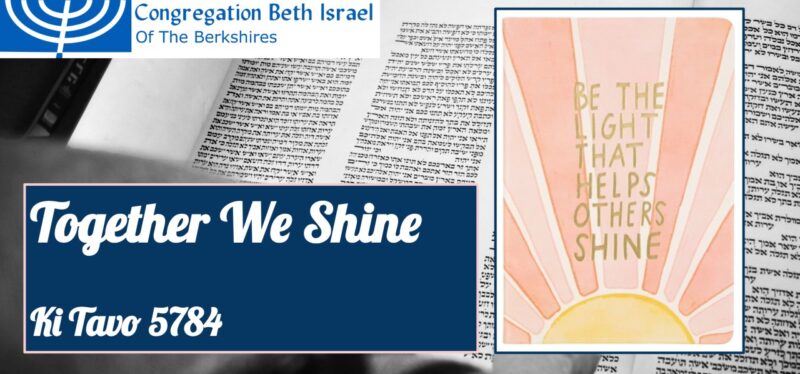Earlier this week I was studying the writings of the Mei Hashiloach, also known as the Ishbitzer rebbe (d. 1854), on this week’s Torah portion, Ki Tavo. His musing on a seemingly unimportant half of a verse caught my eye and my heart.
The verse is הַשְׁקִ֩יפָה֩ מִמְּע֨וֹן קדְשְׁךָ֜ מִן־הַשָּׁמַ֗יִם / “Look down from Your holy abode, from the heavens[.]” (Deut. 26:15) The Ishbitzer riffs on this verse, noticing that God here is viewing us as a group. And then he writes:
“It’s only when we are seen as a group that we can be at ease. For when God observes the community as a whole, one person clarifies the acts of the other, and each makes his neighbor look good, for each soul has some pristine facet.”
At first my study partners and I thought: is this a back-handed compliment? “Hey, next to you I look great!” But we decided instead to understand that “one person clarifies the acts of another” can mean that we make each other better. We bring out the best in each other.
We are better together than we are apart. This is part of Judaism’s fundamental communitarianism. Judaism is not a solo activity. Think of how many mitzvot require a minyan, ten adults doing something together. Even Torah study traditionally happens in pairs.
Earlier this week I saw my Jewish Journeys students come together to do a mitzvah they wouldn’t have done alone. They were making “blessing bags” – each containing socks and gloves, hygiene supplies, protein bars – to give away to folks who are unhoused and in need.
Could any one of these kids have assembled the items and made the bags themselves? Arguably, sure; any of us could. But most of us don’t. Each kid provided one batch of items – the toothbrushes, the soaps, the jerky – and together they made short work of that mitzvah.
We are better together than we are apart. It’s a poignant and powerful message to receive from Torah now, with Rosh Hashanah and Yom Kippur less than two weeks away. The moon of Elul is waning. Soon we’ll come together in community to start a new year together.
A lot of us learned, as kids, that the ten days between Rosh Hashanah and Yom Kippur are the ideal time for teshuvah – repentance, return, turning our lives around, apologizing to those whom we’ve harmed so we’re not carrying karmic schmutz on our souls at Yom Kippur.
That’s not wrong, exactly, but it’s also not the whole story. I’d say that these weeks that we’re in now are actually the most ideal time. So that when we come together to celebrate a new year, our hearts can feel clear and light, not weighed down by the old year’s misdeeds and missteps.
As Rabbi Danya Ruttenberg reminds us (following Rambam), teshuvah has five steps. 1) Name and own the harm / acknowledge where we messed up. 2. Begin doing the inner work to become a better person. 3. Make restitution / amends. 4. Apologize. 5. Make better choices.
Teshuvah is a process: not just the apology, but all of the work that has to come before it – and after it. And we do the work because the work matters and it’s the right thing, not because we expect any particular outcome. Teshuvah matters, whether or not forgiveness comes.
The most important outcome, ideally, is that we ourselves are transformed. We become better people who, faced with the same opportunity to mess up, wouldn’t make the same mistake again because we’ve changed. In the eyes of Jewish tradition, that’s what really matters.
We are better, together, than we are apart. I love the Ishbitzer’s the idea that we “clarify” each others’ actions. He’s using that word in the sense of the way an artist might mix a paint color to be clear and lovely, or how a silversmith removes anything extraneous so silver can shine.
At our best, as human beings and as Jews, we help each other shine. What work do we each need to do over the next two weeks so that when we come together as a whole community for the holidays our hearts are clear and we can help each other really shine?
I invite each of us to find one instance where we need to make teshuvah. Maybe we hurt someone’s feelings, or didn’t take their needs into account, or shared gossip without thinking, or – you’ll know where you need to make repair. Find one thing to do to make amends.
Try to make someone in our community shaleim, try to make them more whole. This is our tradition’s language for repairing what we’ve broken. We’re not just gluing the pieces back together, “sorry I broke your coffee cup,” but trying to make the injured party more whole.
And I invite each of us to seek out ways to help each other shine. To encourage each other, and notice good things about each other. To praise and uplift each other: maybe someone cooked a great dish, or ran a great meeting, or did something admirable. Tell them so. Make a habit of uplifting each other.
Imagine if we all did that. Imagine how we might feel different when we stand before God* (whatever that word means to us: God far above or God deep within, Truth, Meaning, Justice, Love) at Rosh Hashanah. Imagine the new year that could flow from that new beginning.
Shabbat shalom.
This is the d’varling that Rabbi Rachel offered at Kabbalat Shabbat services (cross-posted to Velveteen Rabbi.)
Shared with extra gratitude to the Bayit Board for our weekly study time.






